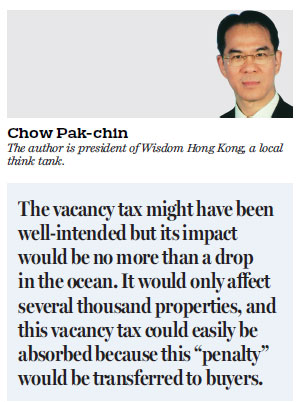Property inflation treatment falls short at diagnosis stage
Updated: 2018-07-06 06:38
(HK Edition)
|
|||||||
A doctor's job is simple. If a patient has a medical problem, it is up to the doctor to diagnose the cause of the problem. With our expert diagnosis, we will consider various treatment options, their effectiveness and possible side effects; then we recommend the best treatment option for the patient.
It is a simple approach and it can be applied to everyday life. In hindsight, the government should have taken a leaf out of the medical book before rolling out measures to ease our perennial housing shortage and arrest sky-rocketing property prices.

Last week, the government announced that apartment-hoarding developers would face an annual vacancy tax amounting to twice the property's annual rental income. Two other measures included: de-linking the pricing of government-subsidized units from private-market rates, and withdrawing at least six prime sites for private housing development from the market so they could be used for affordable housing.
Based on the medical principle of etiology, the proper "diagnosis" is obviously a shortage of land, hence the appropriate "treatment" should be to increase land supply in a sustainable manner.
Honestly speaking, the three proposed measures will not tackle the root of the problem as they don't address the etiology of the "disease". The simple fact is we urgently need to fundamentally boost the much-needed land supply; the solution should be just as simple.
What the government is doing in converting private housing sites into public ones can be likened to the famous saying, "Robbing Peter to pay Paul", which means treating one problem by aggravating another equally serious problem.
It is a common practice that doctors first consider potential risk of adverse effects before administering treatment and medication. In the case of our housing problem, one significant side-effect of de-linking public housing prices from those of the private sector would be creating a chaotic market situation, where most would rush to apply for subsidized homes in popular or prime areas, which would be priced at the same levels as those in remote areas.
To be honest, who wouldn't if prices of government-subsidized units are the same and affordable across the board? It is human nature to want to live a more comfortable life, and most would prefer a home in a better location. Furthermore, this measure has overlooked the obvious fact that home prices should vary from district to district, depending on their characteristics, facilities and locations.
Another side-effect of de-linking public housing prices from private market rates is that it would attract more people to apply for subsidized housing and would have the knock-on effect of intensifying competition, ultimately prolonging the waiting time.
Furthermore, the last measure - reallocating land to public housing supplies - could seriously deplete the private land supply. This would almost certainly push up private property demand and prices; it is just simple logic of demand and supply.
In the end, the only people who would benefit from this outcome are developers and private property owners, who will no doubt be laughing all the way to the bank.
Meanwhile, the vacancy tax might have been well-intended but its impact would be no more than a drop in the ocean. It would only affect several thousand properties, and this vacancy tax could easily be absorbed because this "penalty" would be transferred to buyers.
The government also needs to define the term "vacant" in order to prevent people from taking advantage of a possible loophole. Being vacant could mean being left unsold for one year after obtaining a certificate of compliance, rather than an occupation permit.
There is a deadline for obtaining an occupation permit but there is no deadline for a certificate of compliance, which marks the completion of a development. Developers could potentially abuse this flexibility by taking longer to finish minor works on a property - an indirect form of hoarding.
In the world's most expensive and least affordable housing market, Hong Kong's property prices will continue to soar as they had been doing for more than two years as of April.
This means the proposed measures would do little to dampen the overheated housing market and public anger will not subside in the foreseeable future.
In the face of rising public discontent, it is understandable that the government would want to resort to short-term measures for instant relief while seeking more sustainable longer-term solutions.
As regards the five-month public consultation on 18 options to boost land supply, it is not dissimilar to giving a patient five months to think about and choose from 18 treatment options. How could this not be a waste of time? Now we are weeks into the consultation but public consensus is as elusive as ever.
At the end of the day, it is very unlikely anyone would dispute that affordable housing is a right way forward. In reality though, we cannot roll out so much of it without a well thought-out land-supply policy. If we intensify demand without a reasonably sufficient and sustainable supply of land then we will inevitably drive up prices; we will end up being worse off than before.
My take on the government's proposed measures can be best summed up by a Chinese proverb: "How can we extinguish a fire set on a cartload of firewood with only a cup of water?"
(HK Edition 07/06/2018 page12)